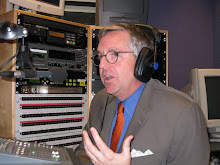The election of President Obama has been tied to many, historical firsts. It also heralded in the end of an era, one of hands-off government. Some of us more partisan types like to think of it more as an end of an error, but that is another story, told only with a pint in an appropriate establishment.
One of the interesting firsts the new President brings to the White House is that he is considered to be the first urban President of our generation. For those of us oriented toward local government and urban affairs, this is a huge opportunity to correct the feeling of disconnect and abandonment by the federal government.
As the Senate prepares to debate the President’s proposed economic bailout bill today of the proposed $825 million (+ as the Senate is probably adding some pieces in) is committed to infrastructure investment for jobs creation and necessary improvements. A large portion of that money will be committed to state and local governments to allocate for specific infrastructure projects and programs that are “shovel ready.” Some of the money will go to states and some directly to local governments.
The Bush administration was never considered a friend of cities and local governments, while President Obama, right from his election, is considered the first modern urban President. The President, a now former resident of Chicago, used some of his transition time to meet with key Mayors from the U.S. Conference of Mayors and the National League of Cities, as well as with County Supervisors from the National Association of Counties and representatives of redevelopment and housing agencies.
The transition meetings with the then President-elect and his key staff members were on a number of issues – from including cities’ infrastructure and job needs in the proposed economic stimulus bill to a discussion of what might constitute an urban legislative agenda.
In the Clinton White House, the President’s Intergovernmental Affairs Office was a key place to intersect the needs of local governments into White House Policy. The Office was a problem-solver and generator of innovative policies and programs including federal grant program that put thousands of new police on the streets and increased public transportation investments. Mayors and local government leaders were always welcome in The White House and I had the pleasure of meetings in The West Wing during my tenure in City Hall during the Clinton Administration.
While President Bush’s Administration seemed to have a minimal interest in local government, to the point of eliminating COPS grants and other federally funded programs to Counties and Cities. The Bush Administration pushed programs out of the federal government and essentially dumped them onto states and local governments- without funding and dumped the problem onto the High Streets of America.
President Obama has committed to re-energize and change the relationship between the federal government and both state and local governments.
If you get a chance, read a fascinating article in Friday, January 30, 2009 New York Times by reporter John Schwartz on President Obama’s turn toward “progressive federalism.”
When the federal government can engage in active dialogue and the creation of policies and programs allowing state and local governments the flexibility to adapt to their constituencies, there seems to be a feeling this is the best of all worlds. Cooperative or progressive federalism allows federal laws, regulations and policies ensure a baseline of equity among states – but allow state and local governments to build on that baseline.
As Scotland defines its path through increased autonomy from London, or full independence – the role of local governments can be crucial in successful development and implementation of public policies and not a recreation of what has happened frequently in American politics.
The last few years have seen an unending conflict where states and local government battle the federal government on programs and funding. Then, when programs and policies move from Washington to state capitols, the same battle is replayed between state capitols and local governments.
Turning this relationship on its head is good for the development and implementation of policy, as well as it being good for politics.
Tuesday, February 3, 2009
Subscribe to:
Post Comments (Atom)

No comments:
Post a Comment